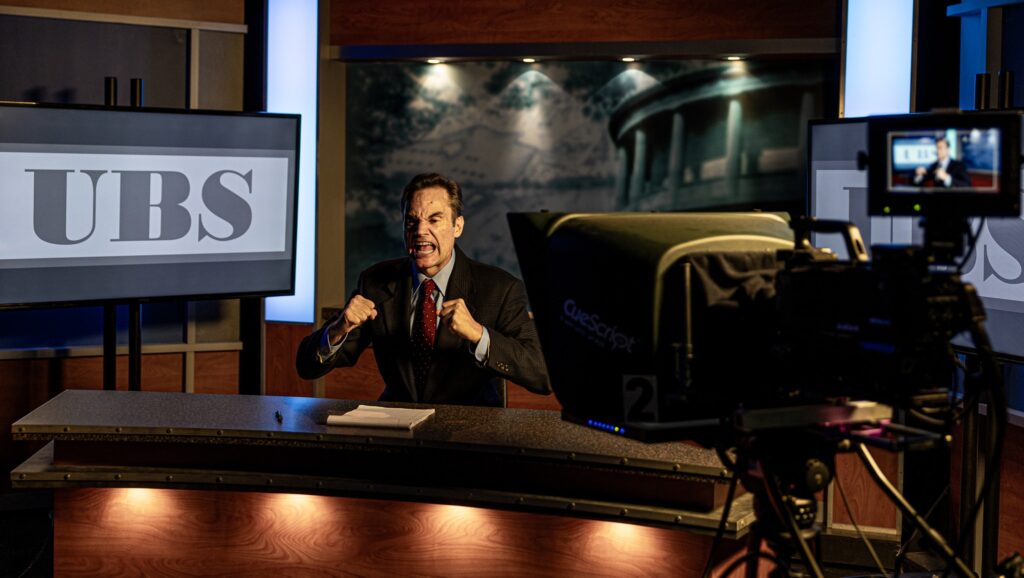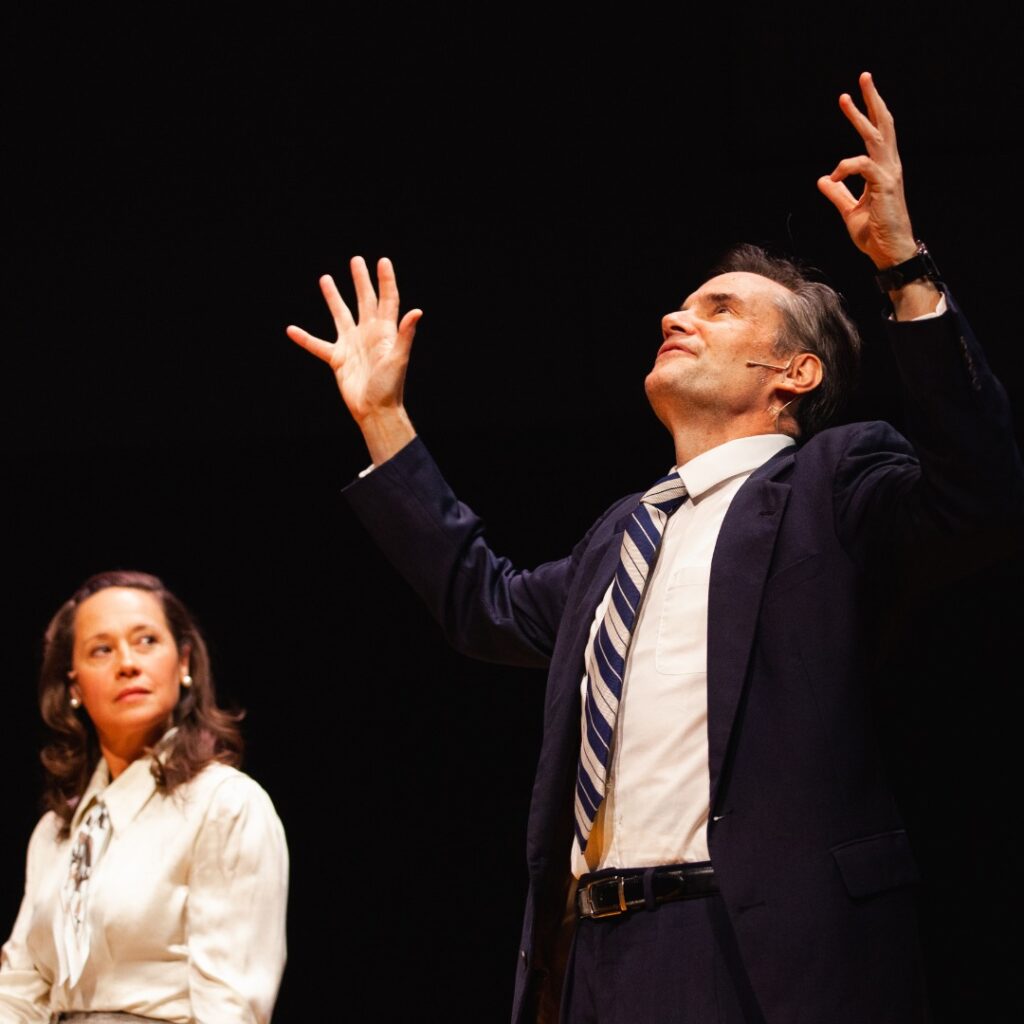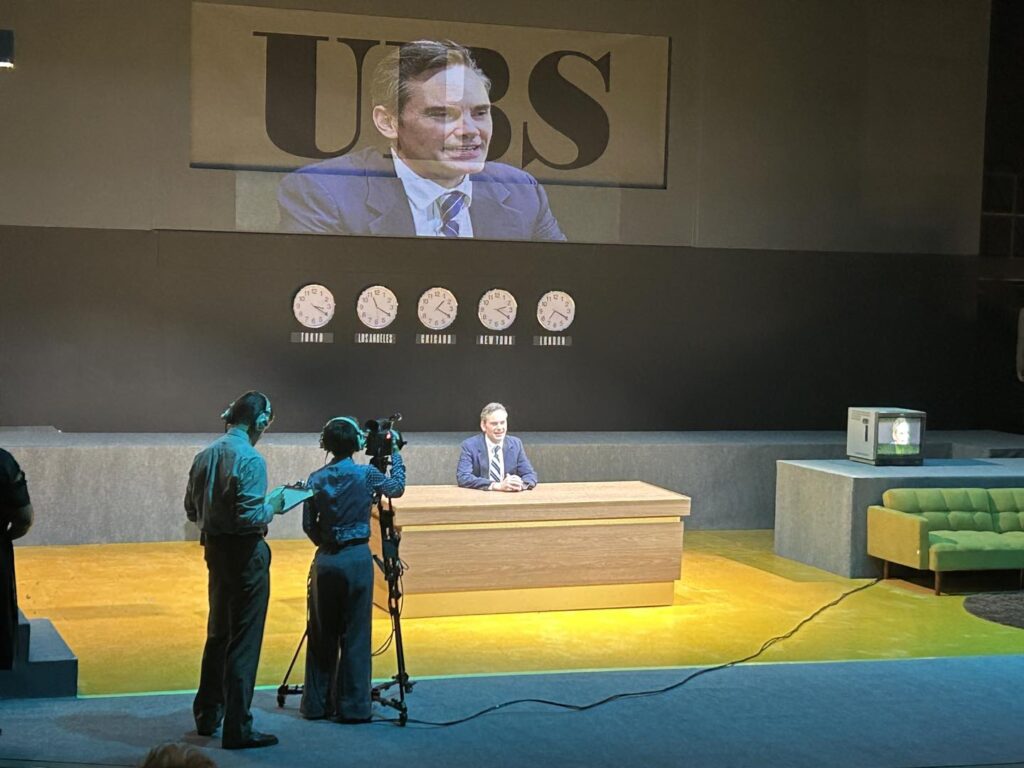
‘Network’ – Based on the screenplay by Paddy Chayefsky. Adapted for the Stage by Lee Hall. Directed by Ashley Kelly Tata. Scenic Designer, Afsoon Pajoufar; Lighting & Projections Designer, Seif Allah Salotto-Cristobal; Audio Designer, Aubrey Dube; Costume Designer, Nancy Leary. Presented by Umbrella Arts Center, Main Stage Theater40 Stow St, Concord, MA, through November 3
by Mike Hoban
It’s always a challenge to bring an iconic movie to the stage, even more so when its signature line, “I’m as mad as hell, and I’m not going to take it anymore!” is one of the most recognizable in film history (#19 on the list of America’s Greatest Movie Quotes according to the American Film Institute). It’s also a lot of pressure to put on an actor, but as the network news anchor turned crazed prophet Howard Beale, Bill Mootos delivers, and he does so without mimicking the brilliantly maniacal performance of Peter Finch (who played Beale in the film). Instead, his portrayal of Beale is more of a world-weary “grand old man of the news” gone mad, and it works beautifully – without losing any of the intensity of the character.
In Network, Beale’s career as a news anchor is nearing its end – his ratings are slipping, and his drinking is worsening following the death of his wife. After learning over drinks with his news director and longtime friend Max Schumacher (Barlow Adamson) that he’s about to be fired from his job after 25 years in the business, he goes on air the next night and tells the 67 national network affiliates, “I’m going to blow my brains out right on this program a week from today.”

He’s literally pulled from the air during the show and suspended, but the following day, he convinces Max to give him a chance to apologize. He goes on air, ostensibly for the last time, and instead delivers a mini-sermon on how all of life is essentially “bullshit”. His rant connects with the audience, and instead of firing him, he’s given his own network show at the urging of the uber-ambitious programming executive Diana Christensen (Blythe de Oliveira Foster). VP Frank Hackett (Steven Barkhimer) initially protests, citing the ethical dilemma of putting a mentally unstable person on air, but Diana counters, “We’re not in the business of morality. We’re in the business of business.” Despite the fact that Beale is hearing voices in his head, the show becomes a huge ratings hit after he delivers his “Mad as Hell” speech, and as often happens when you rely on unstable personalities, the monster that the network has created can’t be controlled, much to the chagrin of the corporate execs.
Umbrella Arts’ production benefits greatly from the performances of not only Mootos, but its core of Boston veterans in supporting roles. Adamson’s performance as Max is one of his strongest in recent years, as he effectively conveys the angst of his concurrent personal and professional midlife crises. Barkhimer channels Steve Bannon as the soulless scumbag Frank Hackett (“We’re not a respectable network. We’re a whorehouse network, and we have to take whatever we can get,” he tells the network president), and Amy Barker is convincing as Max’s wife. We genuinely feel her hurt when Max leaves her after 25 years of marriage for a clearly doomed relationship with Diana. Foster gives an uneven performance in the challenging role of Diana but also has some strong moments as the programming exec without a conscience.

The ambitious production is not without its flaws, mainly the multimedia aspects of the show. In addition to the action on stage, there is a giant screen on the back wall, flashing snippets of 1970s TV shows and commercials as well showing us the action that we’re seeing in real-time. While it adds a really cool dimension to the production, it also tends to distract from the narrative. Making matters worse, the massive logo of the network sits squarely in the center of the screen, distorting the images being displayed. The production also feels a little rushed. (The original 2018 Broadway production was two hours, and Umbrella’s clocks in at a brisk 90 minutes.) The most glaring example of this is a scene where Diana is seducing Max while talking about the news business, mounts him on a table, and the entire process is over in the blink of an eye. What could have been an interesting and funny scene feels more like they were checking the box on the script. (It should be noted that some shows don’t always find their rhythm until later in the run, and with the multimedia elements, this is a difficult show to stage).

Network is at its best when viewed as a period piece. When the film first hit theaters in 1976, it was seen as a timely indictment of the corporatization of the news business – one that put profit over truth. Little did we know that not only would Network be prescient, but the decline of journalistic integrity depicted would only be the tip of the iceberg. The Howard Beale Show now looks like the blueprint for the journalist-as-carnival-barker genre of broadcast “news,” which gave us the likes of Glenn Beck (remember him?), Tucker Carlson, and Jesse Waters.
Despite some of the production’s flaws, this is still really compelling theater. There’s also some engaging audience participation, and on opening night, the audience was screaming, “I’m as mad as hell, and I’m not going to take it anymore!” along with Howard Beale. While it’s disturbing to see that corporate news has become little more than entertainment, it’s productions like Umbrella’s Network that remind us that the primary purpose of theater is to entertain, even if it does make us think. See it.
For tickets and information, go to: https://theumbrellaarts.org/

